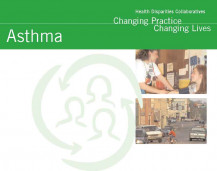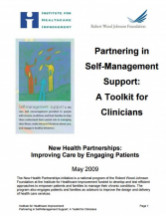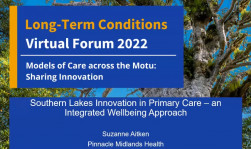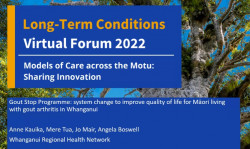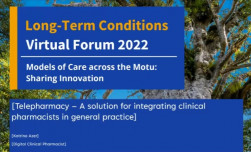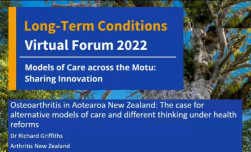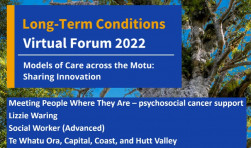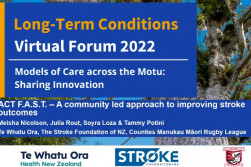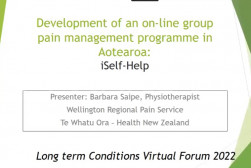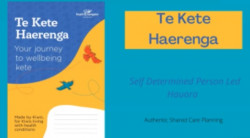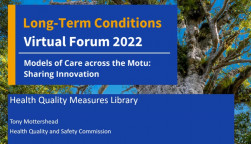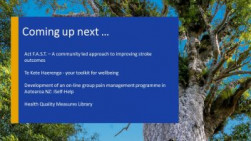Long-term conditions have been described as "the healthcare challenge of the 21st century" by the World Health Organisation. This is due to the increasing burden of disease and mortality attributable to long-term conditions not only in developed countries, but increasingly in developing countries as well.
Low or no data? Visit zero.govt.nz, scroll down the page then click on our logo to return to our site and browse for free.
Long-term conditions for healthcare providers
Key information about long-term conditions
- This page contains information about long-term conditions for health care providers.
- Find information on resources, assessment tools and webinars.

 |
Te Kete Haerenga your journey to wellbeing toolkit Developed by the Health Navigator team, this toolkit provides a range of useful tools, resources, and tips for people wanting to self-manage, set goals and improve their wellbeing when living with long-term conditions or problems with sleep, anxiety, fatigue etc. |
|
|
Health Disparities Collaboratives Training Manual for Improving Chronic Conditions(external link) Excellent overview manual as well as disease specific manuals for asthma, diabetes and depression.
|
 |
NZ Telehealth Resource Centre(external link)
|
|
Participants in an Institute of Medicine Roundtable on Value & Science-Driven Health Care have developed a checklist of critical components for organisations interested in delivering high value health care. The following ten items are discussed with brief examples in the document. Foundational elements
Infrastructure fundamentals
Care delivery priorities
Reliability and feedback
|
|
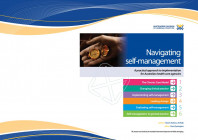 |
This is an excellent guide to the area of self management and chronic care with a large range of resources, tools and information to support organisations with planning, implementation and evaluation of clinical programmes. Produced by the Whitehorse Division of General Practice in Australia. |
|
Partnering in Self Management Support: A Toolkit for Clinicians(external link) "The New Health Partnerships initiative is a national program of the Robert Wood Johnson Foundation at the Institute for Healthcare Improvement funded to develop and test efficient approaches to empower patients and families to manage their chronic conditions. The program also engages patients and families as advisors to improve the design and delivery of health care services." May 2009
|
|
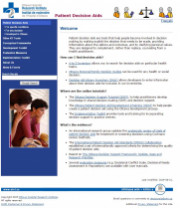 (external link) (external link) |
Ottawa Patient Decision Aids(external link) Developed by the Ottawa Health Research Institute, affiliated with The Ottawa Hospital and The University of Ottawa. The Patient Decision Aids research program was developed to help patients and their health practitioners make "tough" healthcare decisions. "Tough" healthcare decisions may have many options, uncertain outcomes or benefits and harms that people value differently.
|
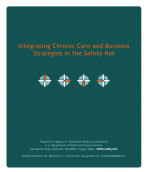 (external link) (external link) |
Integrating Chronic Care and Business Strategies in the Safety Net Prepared by Group Health’s MacColl Institute for Healthcare Innovation, in partnership with RAND and the California Health Care Safety Net Institute. Agency for Healthcare Research and Quality. September 2008. |
| ACIC | organisations or practice teams |
Assessment of Chronic Illness Care(external link) useful survey tool developed by the Improving Chronic Illness Care team, used internationally by hundreds of organisations to assess where your practice or organisation is with implementing the chronic care model. |
| PACIC | patients |
Patient Assessment of Chronic Illness Care(external link) This survey tool was also developed by the Improving Chronic Illness team and gives a patient perspective of the quality of care provided by an organisation or practice team. "The survey includes 20 items, and should be sufficiently brief to use in many settings. When paired with the ACIC, these tools can provide complementary consumer and provider assessments of important aspects of care for chronic illness patients." |
| CHAT | screening tool for use with patients |
Case-finding and Help Assessment Tool for life-style and mental health assessment of adults (16 years and over) in primary health care. Useful 9 item validated tool developed by a multi-disciplinary team from Auckland University and led by Professor Felicity Goodyear-Smith. The tool assesses for physical inactivity, tobacco use, alcohol and other drug misuse, problem gambling, depression, anxiety and stress, abuse and anger problems. For each item (one or two questions) patients are asked whether this is something with which they would like help, either during this consultation or at a later date.
|
| PCRS | use by healthcare teams |
Assessment of Primary Care Resources & Supports for Chronic Disease Self Management -developed by the Robert Johnson Foundation Diabetes Initiative, March 2006 as an instrument that is congruent with the Chronic Care Model while expanding the self management component.
|
- The MacColl Institute for Healthcare Innovation(external link) Improving Chronic Illness Care is a national programme of The Robert Wood Johnson Foundation, with special interest in guidelines, specialty expertise and information systems for chronic care.
- Institute for Healthcare Improvement(external link) ‘The Institute for Healthcare Improvement (IHI) is a not-for-profit organisation driving the improvement of health by advancing the quality and value of health care.’
- The Self-Management Resource Center(external link) (SMRC)has been given the Stanford patient education modules originally developed by the Patient Education Research Centre at Stanford University, USA, led by Dr Kate Lorig(external link). Over the past 30 years, the two groups have developed, tested, and evaluated self-management programmes for English and Spanish speakers with long-term health conditions. More recent programmes include carers and the SMRC has extended their delivery modes to include virtual, mailed tool kits, and mailed tool kits with conference phone calls.
- The World Health Organization(external link) has a large range of resources, reports, studies and information relevant to improving chronic care.
- The Flinders Human Behaviour & Health Research Unit(external link) Flinders University, Adelaide, Australia. A centre for research, evaluation and development of chronic condition management. This includes coordinated care, care planning, behavioural change and self-management and specialises in the education and training of health professionals and consumers.
- Ottawa Health Research Institute(external link) The Ottawa Health Research Institute (OHRI) is the research arm of the Ottawa Hospital and a major part of the University of Ottawa Faculties of Medicine and Health Sciences. Website contains large range of health information and are the group that developed a range of evidence based decision aids.
The Ministry of Health's Long-Term Conditions Forum for DHBs and primary care providers held in February 2020 showcased innovative programmes improving outcomes for Māori and Pacific people, integrating care across services, providing consumer-centric care and improving mental wellbeing. Watch these videos from the Forum.
Video: Opening address – Hon Peeni Henare | LTC Forum 2020
(Healthify He Puna Waiora, NZ, 2020)
Video: Developing the Peer and Lived Experience Workforce
(Health Literacy, NZ & Healthify He Puna Waiora, NZ, 2020)
Video: Delivering culturally competent care – a Pacific perspective
(Health Literacy, NZ & Healthify He Puna Waiora, NZ, 2020)
Video: Optimising long-term condition management using kaiāwhina
(Health Literacy, NZ & Health Navigator NZ, 2020)
Video: Highlights from 'Talking about health' research project
(Health Literacy, NZ & Health Navigator, NZ, 2020)
Video: Tips for improving person-centred care
(Health Literacy, NZ & Health Navigator, NZ, 2020)
Video: The importance of palliative care and spiritual care
(Health Literacy, NZ & Health Navigator, NZ, 2020)
Programme
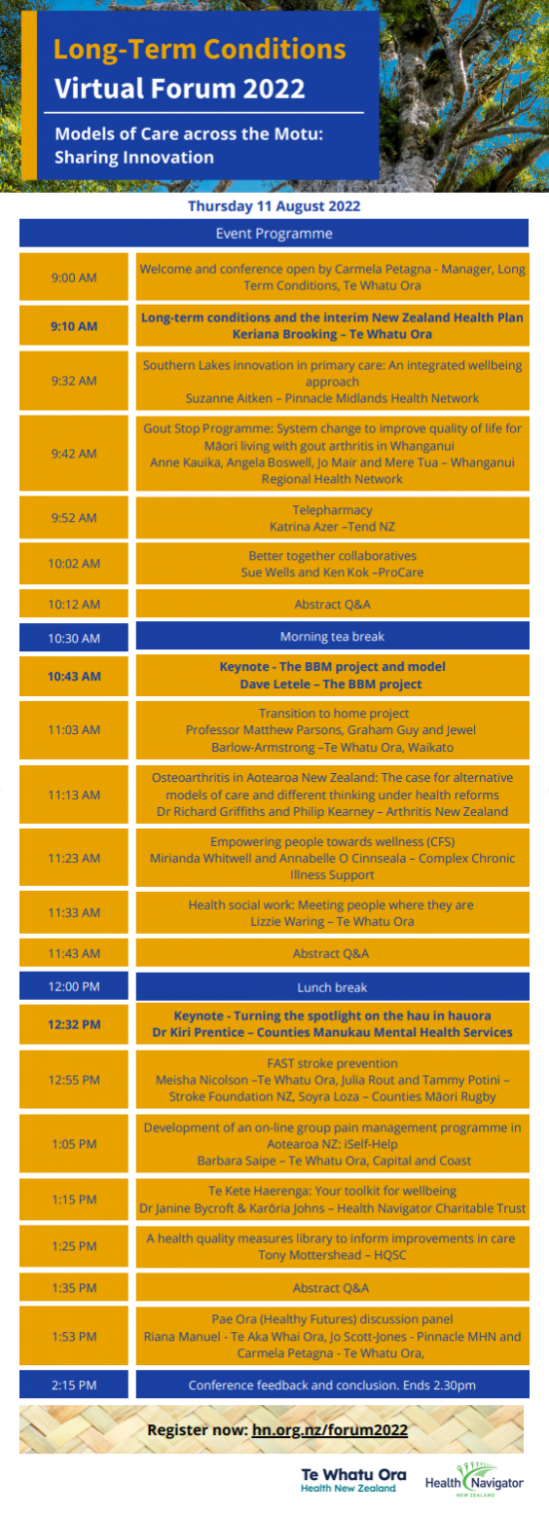
Presentations
|
|
Welcome to conference |
|
|
Keynote 1. Long-term conditions and the interim Health New Zealand health plan |
|
|
Southern Lakes innovation in primary care - an integrated wellbeing approach |
|
|
Gout stop programme – System change to improve quality of life for Māori living with gout arthritis in Whanganui |
|
|
Telepharmacy - a solution for integrating clinical pharmacists in general practice |
|
|
Better together collaboratives – Bringing practices together to improve delivery of care |
|
|
Abstract Group 1 Q&A Panel |
|
|
Keynote 2. The BBM project and model |
|
|
Transition to home: A DHB led innovation project |
|
|
Osteoarthritis In Aotearoa New Zealand: The case for alternative models of care and different thinking under health reforms |
|
|
Empowering people towards wellness |
|
|
Meeting people where they are - psychosocial cancer support |
|
|
Abstract Group 2 Q&A Panel |
|
|
Keynote 3. Turning the spotlight on the hau in hauora |
|
|
Act F.A.S.T. – A community led approach to improving stroke outcomes |
|
|
Development of an on-line group pain management programme in Aotearoa NZ: iSelf-Help |
|
|
Te Kete Haerenga - your toolkit for wellbeing |
|
|
A health quality measures library to inform improvements in care |
|
|
Abstract Group 3 Q&A Panel |
|
|
Pae Ora Discussion Panel |
|
|
Virtual Forum Round-Up |
Feedback
If you attended the forum or watched the presentations afterwards, please consider answering our short survey. Your feedback is invaluable and will help inform the 2023 forum. Answer the survey(external link).
Conference welcome and opening
Carmela Petagna

Manager - Long Term Conditions | Health New Zealand | Te Whatu Ora
Carmela has been in the role as Manager, Long Term Conditions since December 2020. Prior to this, Carmela has held a number of roles across public and private entities, and the latest was as Senior Manager at the Health Quality & Safety Commission, where she led a number of national quality improvement programmes. This included national programmes to address falls prevention, medication safety with a focus on reducing harm from opioids, frailty, and specific interventions to reduce UTIs for residents in aged residential care, and an innovative quality improvement programme across primary care through a partnership model in ‘Whakakotahi’. Carmela is a strong believer in growing strong and trusted relationships, bringing teams and agencies together to identify areas of common interest and where collective work results in the best outcomes for those we are here to support. She is passionate about wanting to drive improved health outcomes for those with or at risk of long-term conditions.
Keynote Speaker – Long-term conditions and the interim New Zealand Health Plan
Keriana Brooking

Interim National Director Commissioning | Health New Zealand | Te Whatu Ora
Keriana Brooking is the Interim National Director Commissioning at Health New Zealand | Te Whatu Ora post the end of her tenure as Hawke’s Bay District Health Board Chief Executive Officer. Prior to that, Keriana was with the Ministry of Health in a number of senior positions, starting as Chief Advisor System Integration, Deputy-Director General Health System Improvement and Innovation and the inaugural Deputy Chief Executive for Covid. In 2001 when she first stepped into a senior role in health, it was as DHB Planning and Funding Manager at Tairawhiti District Health Board. When Primary Health Organisations (PHOs) first formed in 2002, she became Chief Executive Officer of Turanganui PHO. Subsequently six PHOs merged, and in 2010 Keriana went on to become Deputy CEO and General Manager Practice Services of the Midlands Health Network.
Keriana has whakapapa links to Ngāti Pāhauwera me Ngāti Kahungunu ki te Wairoa and is widely recognised for her dedication and commitment to improving the health of New Zealanders, backed by a high level of experience in the context of change. She is married to Jack, and for the first time for a long time live children free in Clive, Hawkes Bay.
Keynote Speaker – The BBM project and model
David Letele

Life Coach | The BBM Program
2022 Kiwibank New Zealand Local Hero of the Year, David Letele, is living, breathing proof that obesity can be overcome – and an inspiration to thousands of Kiwis.
Once weighing 210 kilograms, Letele now weighs less than half of that. He achieved this transformation through hard work and dedication and was fuelled with the goal of turning his life around. Dave now works tirelessly to motivate others to deal with the challenges of obesity.
His private Facebook group has over 15,200 members, many of whom have achieved life-changing levels of weight loss and improved cardiovascular fitness. Dave is currently working with public health and social service providers across Auckland to deliver his highly effective BBM programs to improve the health outcomes for New Zealanders dealing with obesity and long-term health conditions.
Keynote Speaker - Turning the Spotlight on the Hau in Hauora
Dr Kiri Prentice

Consultant Psychiatrist | Whitiki Maurea Māori - Mental Health and Addiction Service
Deputy Clinical Director Māori | Counties Manukau Mental Health Services
Professional Teaching Fellow | University of Auckland
YouTuber | Māori Minds
Dr Kiri Prentice (Ngai Tūhoe and Ngāti Awa) is a Consultant Psychiatrist at Whitiki Maurea Māori Mental Health and Addiction Service, Deputy Clinical Director Māori at Counties Manukau Mental Health Services, a Professional Teaching Fellow at the University of Auckland, and YouTuber based in Tāmaki Makaurau, Auckland. Dr Prentice has a passion for Māori mental health and philosophy, with a particular focus on integrating mātauranga Māori and tikanga into the mental health system. These interests are reflected in the videos Dr Prentice creates for her YouTube channel Māori Minds.
Pae Ora Healthy Futures Discussion Panel
Carmela Petagna

Manager - Long Term Conditions | Health New Zealand | Te Whatu Ora
Carmela has been in the role as Manager, Long Term Conditions since December 2020. Prior to this, Carmela has held a number of roles across public and private entities, and the latest was as Senior Manager at the Health Quality & Safety Commission, where she led a number of national quality improvement programmes. This included national programmes to address falls prevention, medication safety with a focus on reducing harm from opioids, frailty, and specific interventions to reduce UTIs for residents in aged residential care, and an innovative quality improvement programme across primary care through a partnership model in ‘Whakakotahi’. Carmela is a strong believer in growing strong and trusted relationships, bringing teams and agencies together to identify areas of common interest and where collective work results in the best outcomes for those we are here to support. She is passionate about wanting to drive improved health outcomes for those with or at risk of long-term conditions.
Riana Manuel

RN
Chief Executive/Tumu Whakarae | Te Aka Whai Ora
Riana’s previous role was Chief Executive Officer of Hauraki Primary Health Organisation and Te Korowai Hauora o Hauraki. She has invested heavily in developing strategic, visionary leadership within the Māori and health sectors, and been involved with Kaupapa Māori organisations for most of her career.
Dr Jo Scott-Jones
 GP and Medical Director, Pinnacle, Midlands Health Network
GP and Medical Director, Pinnacle, Midlands Health Network
Jo is a GP with a practice in Opotiki, a community he has served since 1992. Since starting work with Pinnacle MHN in September 2016, Jo's clinical work has been in practices throughout the network. As medical director Jo is the voice of general practice on the leadership team, and the face of Pinnacle general practice on numerous local, regional and national bodies.
Jo has had a long involvement in medical governance and has been the chair of the Rural General Practice Network, was the inaugural chair of the Rural Health Alliance Aotearoa New Zealand, and is currently an elected member on the board of the RNZCGP. He has been an examiner for the RNZCGP and a Cornerstone assessor. He is also the chair for the PHO Clinical Leads group and facilitates sharing of resources, and knowledge across the motu. In his spare time he's a podcaster, writer and lifelong learner, having amassed multiple diplomas and additional studies over the years.
PRESENTATIONS
Better Together Collaboratives
A/Prof Susan Wells

Clinical Director (Population Health) | ProCare PHO. Associate Professor Epidemiology | School of Population Health, University of Auckland
Susan is Clinical Director (Population Health) at ProCare PHO and Associate Professor Epidemiology at the School of Population Health, University of Auckland. She was a GP for 10 years before becoming a Public Health Medicine Specialist. Her PHO work focuses on population health and equity including tracking and monitoring the impact of primary care interventions and her research area is on cardiovascular risk equity and management. Since 2002, Sue has led the PREDICT cohort study from which new CVD risk prediction equations have been developed for Aotearoa New Zealand. She was one of seven NZ e-health ambassadors supporting the adoption of patient portals.
Development of an online group pain management programme in Aotearoa NZ: iSelf-Help
Barbara Saipe

Professional Leader - Physiotherapy | Health New Zealand | Te Whatu Ora Capital and Coast. Pain Management Physiotherapist | Wellington Regional Pain Service
A Physiotherapist by training, Barbara currently works as the Professional Leader for Physiotherapy at Health New Zealand | Te Whatu Ora Capital and Coast and also as a pain management physiotherapist for the Wellington Regional Pain Service. She will be presenting on behalf of, a clinically based research team funded by the Health Research Council to develop an initiative that has involved collaboration between Capital and Coast, Otago University, Wellington School of Medicine, Melon health, the whānau of Kokiri Marae and past participants of previous in person pain management groups.
Empowering People Towards Wellness
Miranda Whitwell

CEO | Complex Chronic Illness Support
Miranda Whitwell is the CEO of Complex Chronic Illness Support. With a background in Comprehensive Nursing, Miranda moved into coordinating the continuing education for GPs and Practice Nurses for the Rotorua area, she also coordinated some research projects on behalf of the University of Auckland and University of California. In 2019 she returned to her health roots and join the Complex Chronic Illness Support group. With a passion for the holistic support provided to those with chronic health conditions, Miranda enjoys the role in managing the day to day activities of CCI Support and supports the facilitation staff throughout New Zealand. Bringing the Towards Wellness Programme onto an online platform has been quite an accomplishment, and she is looking forward to seeing many families supported within New Zealand through it.
Annabelle OCinnseala

Bachelor of Community Health - Majoring in Public Health
Clinical Aromatherapy qualified
Facilitator | Complex Chronic Illness Support
Annabelle’s interest in holistic health started after completing her Clinical Aromatherapy qualification in 2002. Over the years she has managed a massage therapy business, taught/teach yoga/mindfulness, and worked/supported people of all ages with various disabilities. After completing my Bachelor of Community Health (Majoring in Public Health) in 2020, she is passionate about integrating previous holistic approaches into her work ethos. Annabelle believes there is a place for both medical and complementary approaches and that everyone is entitled to a good quality of life best suited for them. She thrives in helping people achieve this and enjoys walking this path with members of CCI Support and their families.
F.A.S.T. community-led approach to improving stroke outcomes
Meisha Nicolson

Senior Researcher - Research and Evaluation - Promotion Arm of the National Public Health Service | Health New Zealand | Te Whatu Ora
Meisha Nicolson is a Senior Researcher in the Research and Evaluation team in the Promotion Arm of the National Public Health Service at Health New Zealand | Te Whatu Ora. The Research and Evaluation team supports a range of community based and national health promotion activities in the pursuit of equity in health and wellbeing.
Julia Rout

Registered Dietitian
General Manager - Health Promotion and Advocacy | Stroke Foundation of New Zealand
Julia Rout is the General Manager for Health Promotion and Advocacy at the Stroke Foundation of New Zealand. She is a Registered Dietitian and has worked in public health for nearly two decades. Julia and her team work to create environments where it is easier for New Zealanders to reduce their stroke risk, have improved outcomes after stroke and achieve their aspirations. Her team has a priority focus on improving health equity.
Tammy Potini

Tammy Potini has two decades working across communities in education, sports, health, innovation, entrepreneurship and communities to bring opportunities for whanau to feel a sense of belonging using a strength based approach to identifying the needs for whanau, hapu and IWI.
Soyra Loza

Administrator | Counties Maori Rugby League
Soyra Loza is an Administrator for Counties Maori Rugby League, have been a part of the club for 8 years, always striving to give our whanau Maori opportunities to access league across the region of South Auckland. She is passionate about whanau, communities and their well-being giving wrap around support. Tammy is an expressive advocate giving a voice to the disadvantaged families making sure their needs are met.
Gout Stop Programme: system change to improve quality of life for Māori living with gout arthritis in Whanganui
Anne Kauika

Lead Health Promoter and Healthy Lifestyles Advisor | Whanganui Regional Health Network
Anne is the Lead Health Promoter/Healthy Lifestyles Advisor at the Whanganui Regional Health Network. She leads the team working on the Gout Stop programme and has a background in Public Health, nutrition and physical activity.
Angela Boswell

Gout Stop Evaluator | Whanganui Regional Health Network
Project Manager | Health New Zealand | Te Whatu Ora Whanganui
Angela is the Gout Stop Evaluator at the Whanganui Regional Health Network. She is also working as a Project Manager at Health New Zealand | Te Whatu Ora Whanganui after leading the roll-out of HIPs and Health Coaches for WRHN. She has a Masters in Public Health and experience evaluating programmes across the health and social sectors.
Jo Mair

MSN
Practice Facilitator and Clinical Advisor | Whanganui Regional Health Network
Jo is a Practice Facilitator and Clinical Advisor across a number of programmes at the Whanganui Regional Health Network. She is a Registered Nurse with a Master of Nursing and experience working in primary care settings across the Whanganui region, including general practice in both rural and urban areas, prison health service, and Whanganui Accident and Medical.
Mere Tua

BEXSc Certificate Adult Literacy and Numeracy
Gout Stop Kaiawhina and LTC self-management programme coordinator | Whanganui Regional Health Network
Mere is the Gout Stop Kaiawhina and LTC self-management Programme Coordinator at the Whanganui Regional Health Network. She has a Bachelors in Exercise and Sports Science and certificate in Adult Literacy and Numeracy (vocational/workplace). Her role is focussed on prevention, facilitation and support, working with clients in the community with gout and other long term conditions.
Health Social Work - Meeting people where they are
Lizzie Waring

Oncology Social Worker | Health New Zealand | Te Whatu Ora
Lizzie Waring is an Oncology Social Worker with Health New Zealand | Te Whatu Ora. She studied social work in the UK and has worked in Aotearoa New Zealand since 2012, having moved here with her cat and partner. Lizzie has worked in child protection, disability advocacy and health, and is the lead for gynae-oncology within her team. She has a special interest in psychosexual wellbeing and equity for LQBTQIA+ patients.
A health quality measures library to inform improvements in care
Tony Mottershead

Senior Project Manager | Kaiwhakahaere kaupapa matua | HQSC
Tony’s career began in the early 2000’s working with elite athletes and long-term conditions patients as an exercise physiologist. He has since spent 14 years in Canada managing population health programmes and became a leader in quality and access improvement with Alberta Health Services and the Health Quality Council of Alberta. Tony returned to New Zealand in 2019 to undertake a role with Pinnacle Midlands Health Network as GM for strategic development. He currently works with the Health Quality and Safety Commission as a Senior Project Manager within the National Trauma and Health Quality Intelligence teams. When he’s home in Taranaki, you’ll find him spending time with his family at the beach, mountain bike park or making things out of wood.
Osteoarthritis In Aotearoa New Zealand: The case for alternative models of care and different thinking under health reforms
Dr Richard Griffiths

PhD Sociology
Research Manager | Arthritis New Zealand
Richard was appointed Research Manager at Arthritis New Zealand in April 2021 and is responsible for overseeing Arthritis New Zealand’s research activities. This includes coordinating external research grants, summer scholarships and developing new funding opportunities, engaging with our organisation’s key stakeholders and networking with the wider arthritis research community. Richard has many years of experience working in research and evaluation-based roles in market research, consultancy, the academic sector and not-for-profit arena. He has been involved in health and wellbeing projects relating to undiagnosed HIV infection, disability and transport accessibility, dementia daycare programmes, COVID-19, patient experience, sports injuries, smoking cessation and alcohol harm.
Philip Kearney

Bachelor of Commerce, Master of Business Administration
Chief Executive | Arthritis New Zealand
Philip hails from the UK but considers New Zealand home, having emigrated with his family when he was a boy. Previous roles include Director of Development and Alumni Relations at the University of Otago, General Manager Education at the Charities Commission and Chief Executive at Sport Whanganui. He holds a Bachelor of Commerce and a Master of Business Administration. Philip is married to Lesley and they have a daughter. He is an avid sports fan, especially golf, cricket and rugby and is also keen on DIY.
Southern Lakes Innovation in Primary Care - an Integrated Wellbeing Approach
Suzanne Aitken

Clinical Manager - Extended Care - Taupo/Turangi locality | Pinnacle Midlands Health Network
Suzanne Aitken is the Clinical Manager of the Extended Care team in the Taupo/Turangi locality. She has come from a dietetic background and prior to moving to Taupo, she lived and worked in the Manawatu. She has been in the health sector for over 14 years and has seen many changes over this time. She is in awe of the mahi that her team do – day in – day out and the passion that they show for the community they help support.
Te Kete Haerenga
Janine Bycroft

MBChB, Dip Obs, Dip Paeds, MPH (Hons), FRNZCGP (Dist)
Chief Executive Officer and Editor-in-Chief
Janine is the Founder and Clinical Director for the Health Navigator Charitable Trust that owns this website. She is also a GP, and Clinical Lead at ProCare Health for Hēre Toitu, a project with the Ministry of Social Development. Her areas of interest include collaborative care, care planning, self-management support, quality improvement, chronic care, digital health, health literacy and integrated care. She is involved with a number of projects to improve long-term condition management at a local, regional and national level and often presents at various forums. This includes being a member of the national PHO Clinical Leads group, the National Telehealth Clinical Leadership group, Whakarongorau Clinical Advisory Group, and was the primary care clinical lead for the National Shared Care Plan programme from 2010–2014.
Karōria Johns

Partnerships and Community Development Lead
Karōria is passionate about health being reframed as wellbeing and addressing physical health as one area of many that contribute to an individual's holistic health. Other determinants (her preferred resource for this is Te Wheke by Dr Rangimarie Rose Pere) must be examined to enable wellbeing to flourish for Māori people, whānau and communities. She says embracing Māori models of care and whānau perspectives will benefit the system as a whole for both workers and consumers, while simultaneously ensuring intergenerational traumas are addressed and resolved. She believes this work will be transformational.
Telepharmacy - a solution for integrating clinical pharmacists in general practice
Katrina Azer

BPharm CertClinGov MPS PGClinPharm
Clinical Pharmacist Consultant
Katrina is a Digital Clinical Pharmacist integrated in General Practice, a member of the Pharmacy Council of NZ board and a double award winner in the 2020 primary healthcare awards. She is passionate about innovation in pharmacy practice, telepharmacy, evolving models of care and collaborative healthcare. She is a strong advocate for medication safety, medication management, promoting equitable access to medicines and augmenting access to pharmacist services whether in-person or virtually. She believes that access to and collaboration with pharmacists can significantly reduce the burden of long term conditions both for the individual and the economy.
Transition to Home project
Professor Matthew Parsons
PhD MSc BSc (Hons) RGN NZRN
Clinical Chair Gerontology | Health New Zealand | Te Whatu Ora Waikato and University of Waikato
Matthew holds the position of Clinical Chair in Gerontology, a joint appointment between Health New Zealand | Te Whatu Ora Waikato and the University of Waikato. He has spent the last three decades researching and implementing new health services to improve the lives of older people and people with disabilities. His particular area of interest concerns the development of new models of health funding to change health service behaviour and improve quality.
Graham Guy

BSc (Hons) Physiotherapy, PGDip Health Science Rehab
Operations Director - Medicine and OPR | Te Whatu Ora Waikato
Graham is the Operations Director for Medicine and OPR at Health New Zealand | Te Whatu Ora Waikato. Graham originally trained as a Physiotherapist. Over the last 15 years he has led services through a variety of change and service improvement processes that span the patient continuum. This includes working with Primary Care, Non-Government Organisations, Secondary and Tertiary services.
Jewel Barlow-Armstrong

MEd (Hons) NZRN
Project Manager - Transition to Home project | Health New Zealand | Te Whatu Ora Waikato
Clinical Academic Staff Member and PhD Candidate | Te Huataki Waiora School of Health, University of Waikato
Jewel holds the position of Project Manager for the Transition to Home project at Health New Zealand | Te Whatu Ora Waikato. Additionally she is a Clinical Academic Staff Member and PhD Candidate at Te Huataki Waiora School of Health, University of Waikato. Jewel’s PhD focuses on the design and implementation of new health services that will improve the lives of older people and their whānau.
Credits: Healthify editorial team. Healthify is brought to you by Health Navigator Charitable Trust.
Page last updated:


